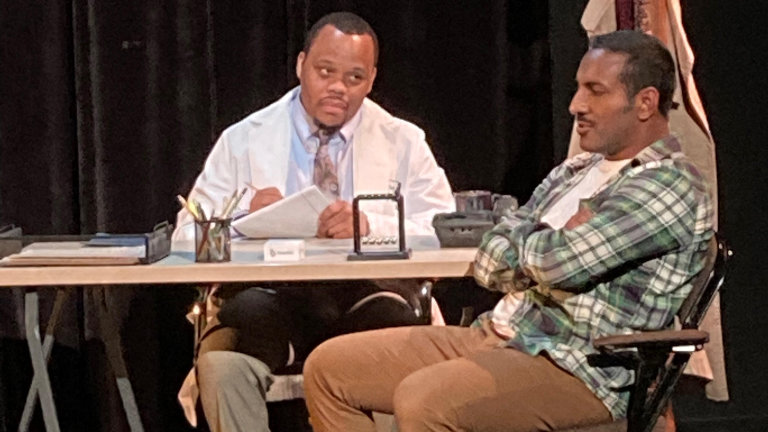By Lynn Venhaus
A strong ensemble cast acts naturally in an unnatural setting in “Locked Ward,” a world premiere mystery-drama by Chicago-based playwright Amy Crider.
Now in its 19th season specializing in producing new works, First Run Theatre effectively realizes Crider’s play, which was inspired by her own journey with bipolar disorder, with sensitivity and compassion.
Crider’s care and concern regarding her characters, which were based on people she met while hospitalized in 1993, is obvious. And director Phil Gill follows through by ensuring a human face has been placed on the internal and external conflicts.
Crider has been on effective medication since 1994, and has been almost entirely in remission ever since, she wrote in the program notes. Her large body of work includes the topic of mental illness, and reflects not only her personal experience, but her desire to educate and make people aware of disorders.
“Locked Ward” is first and foremost a passion project, and it succeeds on its earnestness. While it has humorous elements to lighten interaction, it is serious in its intentions. Do not think of this as “One Flew Over the Cuckoo’s Nest” light.
As Crider does, Gill strives to address the stigma hanging over those living with mental illness. And that is an important aspect of this presentation. In his program notes, he said he hopes it “encourages you all as our audience to see through the labels and instead see the humans that exist” behind the diagnosis.
While it could be heavy-handed in conveying the playwright’s noble intentions, First Run does not lecture, but lets the actors believably develop their familiar characters. The cast makes sure we feel their connections while shading the disparate personalities in an identifiable way.
In life, Crider may crusade, but on the page, she doesn’t preach. She has incorporated information within the framework of a murder mystery, which is a surprising component.
The story takes place in 2003 in a psychiatric ward. When the body of a nurse is found on the floor in the ‘locked ward,’ patients become amateur sleuths, united in their shock and grief. That helps them bond, but also shows their limits as their own personal issues come to the forefront.
For instance, the sweet Eleanor, affectingly portrayed by Uche Ijei, has a manic episode while the group is preparing dinner. Her escalating paranoia puts others at risk when she wields a knife (used to cut vegetables) and must be put in restraints. They smoothly diffuse the situation.
Because the actors demonstrate skill in bringing their characters to life, we get to know them beyond their ‘types’ throughout the two acts.
Duncan Phillips is impressive as Franklin, the rigid obsessive-compulsive whose daily routine of “Star Trek” episodes and the evening news is disrupted when the floor’s television set is removed. You know that character. Smart, sincere, and awkward, Phillips grabs onto solving the mystery like a lifeboat.
In a heartfelt performance, Ethan Isaac is Glen, a troubled ex-cop dealing with post-traumatic stress syndrome, who must work through a tragedy. He also provides investigative know-how as the group ascertains how their floor nurse died.
Jalani “Tamia” Hale is sympathetic as Jill, whose memory is erased with her electric shock therapy. She is heartbreaking as she walks around in a zombie-like state sometimes and has grown an unrealistic attachment to the doctor treating her.
As Vladimir, a rebel-rousing dissident who doesn’t play by the rules, Stephen Thompson maintains a convincing Russian accent. An intelligent guy that sometimes condescends, Vlad’s hostility softens as he works together with the group on a common cause.
Treating these patients is Dr. Blumenthal, and Jaz Tucker keeps us guessing about this guy – is he trustworthy or is he hiding secrets? He does a good job giving the benevolent doctor some layers.
Because of COVID-19, Lillie Weber could not play the health care professional Linda, who takes over from the ‘victim’ the patients were attached to. But stage manager Gwynneth Rausch capably filled in. Because they must adjust anyway to an ‘outsider,’ her insertion worked well as a latecomer, not missing a beat. She also provided some context to the deceased nurse’s private life.
Scenic designer Brad Slavik’s use of weathered second-hand furniture and distinct institutional props fitting such a locale’s layout adds to the production’s lived-in quality. Tony Anselmo’s lighting design enhances the moods and the characters’ emotional states, and technical director Jenn Ciavarella’s sound design is efficient and fluid.
The play is well-staged in the Kranzberg black box theatre so that each character has their moment to shine.
Without simple solutions, the play zigs when you think it will zag, so you are kept somewhat off-guard, avoiding predictability.
While the conclusion seems anticlimactic, and the path towards the resolution gets a little clunky in its exposition, the ensemble’s likability smooths the rough edges.
Overall, the actors’ grow as they share their stories, bridging some of the hurdles perceived in mental health.
Crider does not offer quick fixes, and it would be irresponsible to do so anyway. Because of the way the character’s progress, in the end, the message lands on how much more insight we need on mental illness.
Through First Run, this fiction can be a starting point to learn more.
The St. Louis chapter of the National Alliance on Mental Illness, which serves St. Louis city and county plus the counties of St. Charles, Lincoln, Warren and Jefferson, has provided the company with resources that they have placed in the lobby of the Kranzberg Arts Center. NAMI is an organization of families, friends and individuals whose lives have been affected by mental illness
Crider has also written a mystery novel about her experience with mental illness, “Disorder,” which is available from bookstores, Kindle, and audio.
Crider wrote the play, “Charlie Johnson Reads All of Proust,” that the Midnight Company presented here in May 2019.
You can follow her career, including winning the Tennessee Williams One Act Play contest, on www.amycrider.com.

First Run Theatre presents “Locked Ward” Aug. 12-14 and 19-21 at the Kranzberg Black Box Theatre, 501 N. Grand Blvd., St. Louis. For tickets and information, visit www.firstruntheatre.org.

Lynn (Zipfel) Venhaus has had a continuous byline in St. Louis metro region publications since 1978. She writes features and news for Belleville News-Democrat and contributes to St. Louis magazine and other publications.
She is a Rotten Tomatoes-approved film critic, currently reviews films for Webster-Kirkwood Times and KTRS Radio, covers entertainment for PopLifeSTL.com and co-hosts podcast PopLifeSTL.com…Presents.
She is a member of Critics Choice Association, where she serves on the women’s and marketing committees; Alliance of Women Film Journalists; and on the board of the St. Louis Film Critics Association. She is a founding and board member of the St. Louis Theater Circle.
She is retired from teaching journalism/media as an adjunct college instructor.

